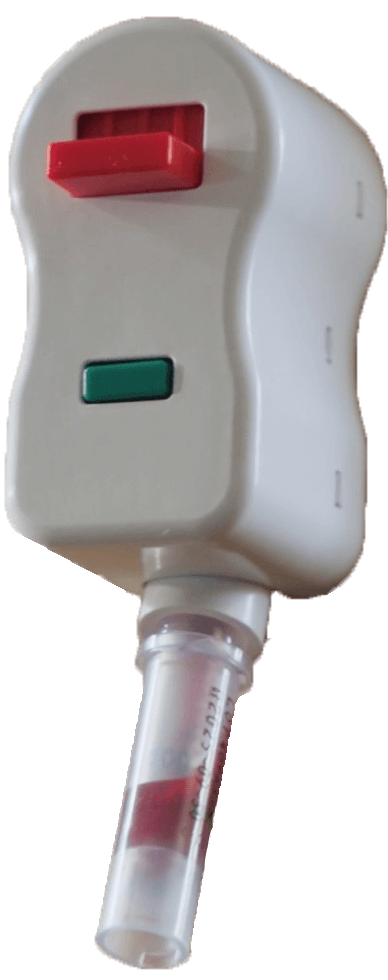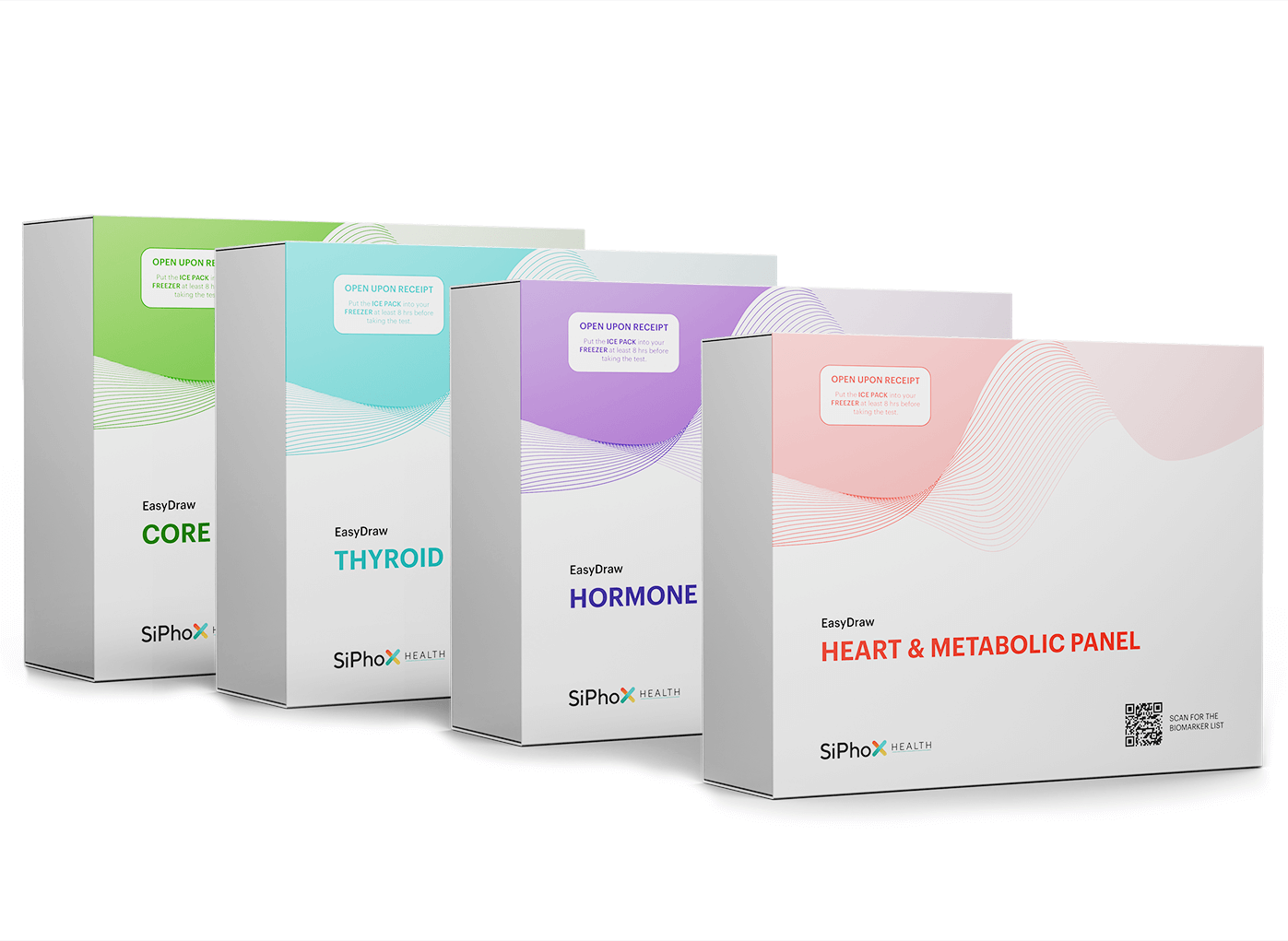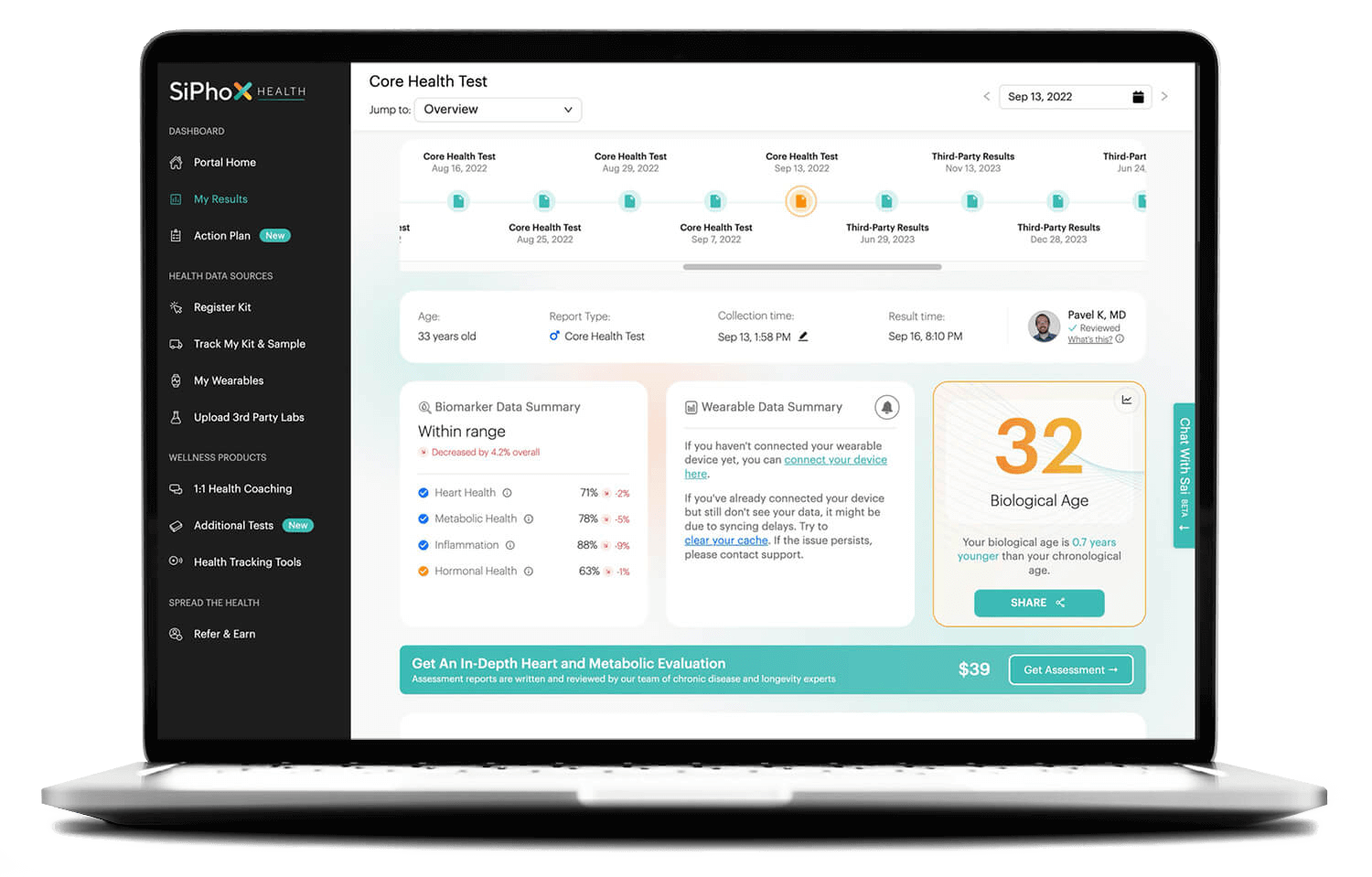Regain Control Over PCOS: Manage Symptoms and Restore Hope
Measure 33 critical blood biomarkers from the comfort of your home to help diagnose, monitor, and manage PCOS effectively. Receive personalized insights based on your hormones, lipids, and metabolic biomarkers, giving you the tools you need to balance your symptoms and regain control. Access expert coaching for support every step of the way.
All for just $125.




(available with membership)




Use Sauna Sessions
Improves metabolic health
Relevant Biomarkers
Manage Stress & Sleep
Improves metabolic health
Relevant Biomarkers
Eat Soluble Fiber
Improves heart health
Relevant Biomarkers
Improve Testosterone Levels
Improves hormonal health
Relevant Biomarkers
Schedule Rest Days
Improves hormonal health
Relevant Biomarkers
Add Calcium Foods
Improves nutritional health
Relevant Biomarkers
Strength Training for Lower Ferritin
Improves nutritional health
Relevant Biomarkers
Add Iron-Rich Foods
Improves nutritional health
Relevant Biomarkers
Increase Lycopene Intake
Improves inflammation & heart health
Relevant Biomarkers
Boost Vitamin B2
Improves thyroid health
Relevant Biomarkers
Adopt Anti-Inflammatory Diet
Improves inflammation
Relevant Biomarkers
Caloric Restriction for Liver Health
Improves liver health
Relevant Biomarkers
Use Sauna Sessions
Improves metabolic health
Relevant Biomarkers
Manage Stress & Sleep
Improves metabolic health
Relevant Biomarkers
Eat Soluble Fiber
Improves heart health
Relevant Biomarkers
Improve Testosterone Levels
Improves hormonal health
Relevant Biomarkers
Schedule Rest Days
Improves hormonal health
Relevant Biomarkers
Add Calcium Foods
Improves nutritional health
Relevant Biomarkers
Strength Training for Lower Ferritin
Improves nutritional health
Relevant Biomarkers
Add Iron-Rich Foods
Improves nutritional health
Relevant Biomarkers
Increase Lycopene Intake
Improves inflammation & heart health
Relevant Biomarkers
Boost Vitamin B2
Improves thyroid health
Relevant Biomarkers
Adopt Anti-Inflammatory Diet
Improves inflammation
Relevant Biomarkers
Caloric Restriction for Liver Health
Improves liver health
Relevant Biomarkers
Use Sauna Sessions
Improves metabolic health
Relevant Biomarkers
Manage Stress & Sleep
Improves metabolic health
Relevant Biomarkers
Eat Soluble Fiber
Improves heart health
Relevant Biomarkers
Improve Testosterone Levels
Improves hormonal health
Relevant Biomarkers
Schedule Rest Days
Improves hormonal health
Relevant Biomarkers
Add Calcium Foods
Improves nutritional health
Relevant Biomarkers
Strength Training for Lower Ferritin
Improves nutritional health
Relevant Biomarkers
Add Iron-Rich Foods
Improves nutritional health
Relevant Biomarkers
Increase Lycopene Intake
Improves inflammation & heart health
Relevant Biomarkers
Boost Vitamin B2
Improves thyroid health
Relevant Biomarkers
Adopt Anti-Inflammatory Diet
Improves inflammation
Relevant Biomarkers
Caloric Restriction for Liver Health
Improves liver health
Relevant Biomarkers
Use Sauna Sessions
Improves metabolic health
Relevant Biomarkers
Manage Stress & Sleep
Improves metabolic health
Relevant Biomarkers
Eat Soluble Fiber
Improves heart health
Relevant Biomarkers
Improve Testosterone Levels
Improves hormonal health
Relevant Biomarkers
Schedule Rest Days
Improves hormonal health
Relevant Biomarkers
Add Calcium Foods
Improves nutritional health
Relevant Biomarkers
Strength Training for Lower Ferritin
Improves nutritional health
Relevant Biomarkers
Add Iron-Rich Foods
Improves nutritional health
Relevant Biomarkers
Increase Lycopene Intake
Improves inflammation & heart health
Relevant Biomarkers
Boost Vitamin B2
Improves thyroid health
Relevant Biomarkers
Adopt Anti-Inflammatory Diet
Improves inflammation
Relevant Biomarkers
Caloric Restriction for Liver Health
Improves liver health
Relevant Biomarkers
Use Sauna Sessions
Improves metabolic health
Relevant Biomarkers
Manage Stress & Sleep
Improves metabolic health
Relevant Biomarkers
Eat Soluble Fiber
Improves heart health
Relevant Biomarkers
Improve Testosterone Levels
Improves hormonal health
Relevant Biomarkers
Schedule Rest Days
Improves hormonal health
Relevant Biomarkers
Add Calcium Foods
Improves nutritional health
Relevant Biomarkers
Strength Training for Lower Ferritin
Improves nutritional health
Relevant Biomarkers
Add Iron-Rich Foods
Improves nutritional health
Relevant Biomarkers
Increase Lycopene Intake
Improves inflammation & heart health
Relevant Biomarkers
Boost Vitamin B2
Improves thyroid health
Relevant Biomarkers
Adopt Anti-Inflammatory Diet
Improves inflammation
Relevant Biomarkers
Caloric Restriction for Liver Health
Improves liver health
Relevant Biomarkers
How it works
Comprehensive biomarker testing from home. No lab visits, no needles, no waiting rooms. Test in minutes, get results in days.

Select your health focus
From comprehensive longevity essentials to targeted hormone, thyroid, or heart & metabolic optimization. You can also upgrade any panel to include up to 60 biomarkers. Your test kit arrives in 3-5 days.
- Arrives in 3-5 days
- Customize your health focus
- HSA/FSA eligible

Test at home, painlessly
Use our EasyDraw device to collect a small blood sample from your upper arm. No needles, no pain, no lab visits. The whole process takes 5 minutes. You can optionally schedule a live one-on-one session with our health expert to guide you for successful sample collection.
- No needles or finger pricks
- Painless upper arm collection
- 5 minute at-home test

Get insights & optimize
Results in 5-7 days with detailed analysis, supplement recommendations, and a personalized action plan. Track changes over time and chat with Sai, our AI longevity expert, about your health.
- Results in 5-7 days
- Personalized supplement & lifestyle recommendations
- Chat with Sai AI about your results
Backed By Leading Experts in Health Optimization

Tsolmon Tsogbayar, MD
Health Programs Lead, Health Innovation
Dr. Tsogbayar leverages her clinical expertise to develop innovative health solutions and evidence-based coaching. Dr. Tsogbayar previously practiced as a physician with a comprehensive training background, developing specialized expertise in cardiology and emergency medicine after gaining experience in primary care, allergy & immunology, internal medicine, and general surgery.
She earned her medical degree from Imperial College London, where she also completed her MSc in Human Molecular Genetics after obtaining a BSc in Biochemistry from Queen Mary University of London. Her academic research includes significant work in developmental cardiovascular genetics, with her thesis publication contributing to the understanding of genetic modifications on embryonic cardiovascular development.

Pavel Korecky, MD
Director of Clinical Product Operations
Director of Clinical Product Operations at SiPhox Health with a background in medicine and a passion for health optimization. Experienced in leading software and clinical development teams, contributing to patents, launching health-related products, and turning diagnostics into actionable tools.

Paul Thompson, MD
Advisor
Paul D. Thompson is Chief of Cardiology Emeritus of Hartford Hospital and Professor Emeritus at University of Connecticut Medical School. He has authored over 500 scientific articles on cardiovascular risk factors, the effects of exercise, and beyond. He received National Institutes of Health’s (NIH) Preventive Cardiology Academic Award, and has received NIH funding for multiple studies.
Dr. Thompson’s interests in exercise, general cardiology and sports cardiology originated from his own distance running: he qualified for the 1972 Olympic Marathon Trials as a 3rd year medical student and finished 16th in the 1976 Boston Marathon. Dr. Thompson publishes a blog 500 Rules of Cardiology where he shares lessons and anecdotes that he has learned over his extensive career as a physician, researcher and teacher.

Robert Lufkin, MD
Advisor
Physician/medical school professor (UCLA and USC) and New York Times bestselling author empowering people to take back their metabolic health with lifestyle and other tools. A veteran of the Today Show, USA Today, and a regular contributor to FOX and other network news stations, his weekly video podcast reaches over 500,000 people. After reversing chronic disease and transforming his own life he is making it his mission to help others do the same.
His latest book, ‘Lies I Taught In Medical School’ is an instant New York Times bestseller and has re-framed how we think about metabolic health and longevity. In addition to being a practicing physician, he is author of over 200 peer reviewed scientific papers and 14 books that are available in fourteen languages.

Ben Bikman, PhD
Advisor
Benjamin Bikman earned his Ph.D. in Bioenergetics and was a postdoctoral fellow with the Duke-National University of Singapore in metabolic disorders. Currently, his professional focus as a scientist and professor (Brigham Young University) is to better understand the role of elevated insulin and nutrient metabolism in regulating obesity, diabetes, and dementia.
In addition to his academic pursuits, Dr. Bikman is the author of Why We Get Sick and How Not To Get Sick.

Tash Milinkovic, MD
Health Programs Lead, Heart & Metabolic
Dr. Natasha Milinkovic is part of the clinical product team at SiPhox Health, having graduated from the University of Bristol Medical School. Her medical career includes rotations across medical and surgical specialties, with specialized research in vascular surgery, focusing on recovery and post-operative pain outcomes. Dr. Milinkovic built her expertise in emergency medicine as a clinical fellow at a major trauma center before practicing at a central London teaching hospital throughout the pandemic.
She has contributed to global health initiatives, implementing surgical safety standards and protocols across rural Uganda. Dr. Milinkovic initially joined SiPhox Health to spearhead the health coaching initiative and has been a key contributor in the development and launch of the Heart and Metabolic program. She is passionate about addressing health disparities by building scalable healthcare solutions.

Tsolmon Tsogbayar, MD
Health Programs Lead, Health Innovation
Dr. Tsogbayar leverages her clinical expertise to develop innovative health solutions and evidence-based coaching. Dr. Tsogbayar previously practiced as a physician with a comprehensive training background, developing specialized expertise in cardiology and emergency medicine after gaining experience in primary care, allergy & immunology, internal medicine, and general surgery.
She earned her medical degree from Imperial College London, where she also completed her MSc in Human Molecular Genetics after obtaining a BSc in Biochemistry from Queen Mary University of London. Her academic research includes significant work in developmental cardiovascular genetics, with her thesis publication contributing to the understanding of genetic modifications on embryonic cardiovascular development.

Pavel Korecky, MD
Director of Clinical Product Operations
Director of Clinical Product Operations at SiPhox Health with a background in medicine and a passion for health optimization. Experienced in leading software and clinical development teams, contributing to patents, launching health-related products, and turning diagnostics into actionable tools.

Paul Thompson, MD
Advisor
Paul D. Thompson is Chief of Cardiology Emeritus of Hartford Hospital and Professor Emeritus at University of Connecticut Medical School. He has authored over 500 scientific articles on cardiovascular risk factors, the effects of exercise, and beyond. He received National Institutes of Health’s (NIH) Preventive Cardiology Academic Award, and has received NIH funding for multiple studies.
Dr. Thompson’s interests in exercise, general cardiology and sports cardiology originated from his own distance running: he qualified for the 1972 Olympic Marathon Trials as a 3rd year medical student and finished 16th in the 1976 Boston Marathon. Dr. Thompson publishes a blog 500 Rules of Cardiology where he shares lessons and anecdotes that he has learned over his extensive career as a physician, researcher and teacher.

Robert Lufkin, MD
Advisor
Physician/medical school professor (UCLA and USC) and New York Times bestselling author empowering people to take back their metabolic health with lifestyle and other tools. A veteran of the Today Show, USA Today, and a regular contributor to FOX and other network news stations, his weekly video podcast reaches over 500,000 people. After reversing chronic disease and transforming his own life he is making it his mission to help others do the same.
His latest book, ‘Lies I Taught In Medical School’ is an instant New York Times bestseller and has re-framed how we think about metabolic health and longevity. In addition to being a practicing physician, he is author of over 200 peer reviewed scientific papers and 14 books that are available in fourteen languages.

Ben Bikman, PhD
Advisor
Benjamin Bikman earned his Ph.D. in Bioenergetics and was a postdoctoral fellow with the Duke-National University of Singapore in metabolic disorders. Currently, his professional focus as a scientist and professor (Brigham Young University) is to better understand the role of elevated insulin and nutrient metabolism in regulating obesity, diabetes, and dementia.
In addition to his academic pursuits, Dr. Bikman is the author of Why We Get Sick and How Not To Get Sick.

Tash Milinkovic, MD
Health Programs Lead, Heart & Metabolic
Dr. Natasha Milinkovic is part of the clinical product team at SiPhox Health, having graduated from the University of Bristol Medical School. Her medical career includes rotations across medical and surgical specialties, with specialized research in vascular surgery, focusing on recovery and post-operative pain outcomes. Dr. Milinkovic built her expertise in emergency medicine as a clinical fellow at a major trauma center before practicing at a central London teaching hospital throughout the pandemic.
She has contributed to global health initiatives, implementing surgical safety standards and protocols across rural Uganda. Dr. Milinkovic initially joined SiPhox Health to spearhead the health coaching initiative and has been a key contributor in the development and launch of the Heart and Metabolic program. She is passionate about addressing health disparities by building scalable healthcare solutions.

Tsolmon Tsogbayar, MD
Health Programs Lead, Health Innovation
Dr. Tsogbayar leverages her clinical expertise to develop innovative health solutions and evidence-based coaching. Dr. Tsogbayar previously practiced as a physician with a comprehensive training background, developing specialized expertise in cardiology and emergency medicine after gaining experience in primary care, allergy & immunology, internal medicine, and general surgery.
She earned her medical degree from Imperial College London, where she also completed her MSc in Human Molecular Genetics after obtaining a BSc in Biochemistry from Queen Mary University of London. Her academic research includes significant work in developmental cardiovascular genetics, with her thesis publication contributing to the understanding of genetic modifications on embryonic cardiovascular development.

Pavel Korecky, MD
Director of Clinical Product Operations
Director of Clinical Product Operations at SiPhox Health with a background in medicine and a passion for health optimization. Experienced in leading software and clinical development teams, contributing to patents, launching health-related products, and turning diagnostics into actionable tools.

Paul Thompson, MD
Advisor
Paul D. Thompson is Chief of Cardiology Emeritus of Hartford Hospital and Professor Emeritus at University of Connecticut Medical School. He has authored over 500 scientific articles on cardiovascular risk factors, the effects of exercise, and beyond. He received National Institutes of Health’s (NIH) Preventive Cardiology Academic Award, and has received NIH funding for multiple studies.
Dr. Thompson’s interests in exercise, general cardiology and sports cardiology originated from his own distance running: he qualified for the 1972 Olympic Marathon Trials as a 3rd year medical student and finished 16th in the 1976 Boston Marathon. Dr. Thompson publishes a blog 500 Rules of Cardiology where he shares lessons and anecdotes that he has learned over his extensive career as a physician, researcher and teacher.

Robert Lufkin, MD
Advisor
Physician/medical school professor (UCLA and USC) and New York Times bestselling author empowering people to take back their metabolic health with lifestyle and other tools. A veteran of the Today Show, USA Today, and a regular contributor to FOX and other network news stations, his weekly video podcast reaches over 500,000 people. After reversing chronic disease and transforming his own life he is making it his mission to help others do the same.
His latest book, ‘Lies I Taught In Medical School’ is an instant New York Times bestseller and has re-framed how we think about metabolic health and longevity. In addition to being a practicing physician, he is author of over 200 peer reviewed scientific papers and 14 books that are available in fourteen languages.

Ben Bikman, PhD
Advisor
Benjamin Bikman earned his Ph.D. in Bioenergetics and was a postdoctoral fellow with the Duke-National University of Singapore in metabolic disorders. Currently, his professional focus as a scientist and professor (Brigham Young University) is to better understand the role of elevated insulin and nutrient metabolism in regulating obesity, diabetes, and dementia.
In addition to his academic pursuits, Dr. Bikman is the author of Why We Get Sick and How Not To Get Sick.

Tash Milinkovic, MD
Health Programs Lead, Heart & Metabolic
Dr. Natasha Milinkovic is part of the clinical product team at SiPhox Health, having graduated from the University of Bristol Medical School. Her medical career includes rotations across medical and surgical specialties, with specialized research in vascular surgery, focusing on recovery and post-operative pain outcomes. Dr. Milinkovic built her expertise in emergency medicine as a clinical fellow at a major trauma center before practicing at a central London teaching hospital throughout the pandemic.
She has contributed to global health initiatives, implementing surgical safety standards and protocols across rural Uganda. Dr. Milinkovic initially joined SiPhox Health to spearhead the health coaching initiative and has been a key contributor in the development and launch of the Heart and Metabolic program. She is passionate about addressing health disparities by building scalable healthcare solutions.

Tsolmon Tsogbayar, MD
Health Programs Lead, Health Innovation
Dr. Tsogbayar leverages her clinical expertise to develop innovative health solutions and evidence-based coaching. Dr. Tsogbayar previously practiced as a physician with a comprehensive training background, developing specialized expertise in cardiology and emergency medicine after gaining experience in primary care, allergy & immunology, internal medicine, and general surgery.
She earned her medical degree from Imperial College London, where she also completed her MSc in Human Molecular Genetics after obtaining a BSc in Biochemistry from Queen Mary University of London. Her academic research includes significant work in developmental cardiovascular genetics, with her thesis publication contributing to the understanding of genetic modifications on embryonic cardiovascular development.

Pavel Korecky, MD
Director of Clinical Product Operations
Director of Clinical Product Operations at SiPhox Health with a background in medicine and a passion for health optimization. Experienced in leading software and clinical development teams, contributing to patents, launching health-related products, and turning diagnostics into actionable tools.

Paul Thompson, MD
Advisor
Paul D. Thompson is Chief of Cardiology Emeritus of Hartford Hospital and Professor Emeritus at University of Connecticut Medical School. He has authored over 500 scientific articles on cardiovascular risk factors, the effects of exercise, and beyond. He received National Institutes of Health’s (NIH) Preventive Cardiology Academic Award, and has received NIH funding for multiple studies.
Dr. Thompson’s interests in exercise, general cardiology and sports cardiology originated from his own distance running: he qualified for the 1972 Olympic Marathon Trials as a 3rd year medical student and finished 16th in the 1976 Boston Marathon. Dr. Thompson publishes a blog 500 Rules of Cardiology where he shares lessons and anecdotes that he has learned over his extensive career as a physician, researcher and teacher.

Robert Lufkin, MD
Advisor
Physician/medical school professor (UCLA and USC) and New York Times bestselling author empowering people to take back their metabolic health with lifestyle and other tools. A veteran of the Today Show, USA Today, and a regular contributor to FOX and other network news stations, his weekly video podcast reaches over 500,000 people. After reversing chronic disease and transforming his own life he is making it his mission to help others do the same.
His latest book, ‘Lies I Taught In Medical School’ is an instant New York Times bestseller and has re-framed how we think about metabolic health and longevity. In addition to being a practicing physician, he is author of over 200 peer reviewed scientific papers and 14 books that are available in fourteen languages.

Ben Bikman, PhD
Advisor
Benjamin Bikman earned his Ph.D. in Bioenergetics and was a postdoctoral fellow with the Duke-National University of Singapore in metabolic disorders. Currently, his professional focus as a scientist and professor (Brigham Young University) is to better understand the role of elevated insulin and nutrient metabolism in regulating obesity, diabetes, and dementia.
In addition to his academic pursuits, Dr. Bikman is the author of Why We Get Sick and How Not To Get Sick.

Tash Milinkovic, MD
Health Programs Lead, Heart & Metabolic
Dr. Natasha Milinkovic is part of the clinical product team at SiPhox Health, having graduated from the University of Bristol Medical School. Her medical career includes rotations across medical and surgical specialties, with specialized research in vascular surgery, focusing on recovery and post-operative pain outcomes. Dr. Milinkovic built her expertise in emergency medicine as a clinical fellow at a major trauma center before practicing at a central London teaching hospital throughout the pandemic.
She has contributed to global health initiatives, implementing surgical safety standards and protocols across rural Uganda. Dr. Milinkovic initially joined SiPhox Health to spearhead the health coaching initiative and has been a key contributor in the development and launch of the Heart and Metabolic program. She is passionate about addressing health disparities by building scalable healthcare solutions.

Tsolmon Tsogbayar, MD
Health Programs Lead, Health Innovation
Dr. Tsogbayar leverages her clinical expertise to develop innovative health solutions and evidence-based coaching. Dr. Tsogbayar previously practiced as a physician with a comprehensive training background, developing specialized expertise in cardiology and emergency medicine after gaining experience in primary care, allergy & immunology, internal medicine, and general surgery.
She earned her medical degree from Imperial College London, where she also completed her MSc in Human Molecular Genetics after obtaining a BSc in Biochemistry from Queen Mary University of London. Her academic research includes significant work in developmental cardiovascular genetics, with her thesis publication contributing to the understanding of genetic modifications on embryonic cardiovascular development.

Pavel Korecky, MD
Director of Clinical Product Operations
Director of Clinical Product Operations at SiPhox Health with a background in medicine and a passion for health optimization. Experienced in leading software and clinical development teams, contributing to patents, launching health-related products, and turning diagnostics into actionable tools.

Paul Thompson, MD
Advisor
Paul D. Thompson is Chief of Cardiology Emeritus of Hartford Hospital and Professor Emeritus at University of Connecticut Medical School. He has authored over 500 scientific articles on cardiovascular risk factors, the effects of exercise, and beyond. He received National Institutes of Health’s (NIH) Preventive Cardiology Academic Award, and has received NIH funding for multiple studies.
Dr. Thompson’s interests in exercise, general cardiology and sports cardiology originated from his own distance running: he qualified for the 1972 Olympic Marathon Trials as a 3rd year medical student and finished 16th in the 1976 Boston Marathon. Dr. Thompson publishes a blog 500 Rules of Cardiology where he shares lessons and anecdotes that he has learned over his extensive career as a physician, researcher and teacher.

Robert Lufkin, MD
Advisor
Physician/medical school professor (UCLA and USC) and New York Times bestselling author empowering people to take back their metabolic health with lifestyle and other tools. A veteran of the Today Show, USA Today, and a regular contributor to FOX and other network news stations, his weekly video podcast reaches over 500,000 people. After reversing chronic disease and transforming his own life he is making it his mission to help others do the same.
His latest book, ‘Lies I Taught In Medical School’ is an instant New York Times bestseller and has re-framed how we think about metabolic health and longevity. In addition to being a practicing physician, he is author of over 200 peer reviewed scientific papers and 14 books that are available in fourteen languages.

Ben Bikman, PhD
Advisor
Benjamin Bikman earned his Ph.D. in Bioenergetics and was a postdoctoral fellow with the Duke-National University of Singapore in metabolic disorders. Currently, his professional focus as a scientist and professor (Brigham Young University) is to better understand the role of elevated insulin and nutrient metabolism in regulating obesity, diabetes, and dementia.
In addition to his academic pursuits, Dr. Bikman is the author of Why We Get Sick and How Not To Get Sick.

Tash Milinkovic, MD
Health Programs Lead, Heart & Metabolic
Dr. Natasha Milinkovic is part of the clinical product team at SiPhox Health, having graduated from the University of Bristol Medical School. Her medical career includes rotations across medical and surgical specialties, with specialized research in vascular surgery, focusing on recovery and post-operative pain outcomes. Dr. Milinkovic built her expertise in emergency medicine as a clinical fellow at a major trauma center before practicing at a central London teaching hospital throughout the pandemic.
She has contributed to global health initiatives, implementing surgical safety standards and protocols across rural Uganda. Dr. Milinkovic initially joined SiPhox Health to spearhead the health coaching initiative and has been a key contributor in the development and launch of the Heart and Metabolic program. She is passionate about addressing health disparities by building scalable healthcare solutions.
Measure Up To 60 Biomarkers From Home
Heart Health
Inflammation
Metabolic Health
Thyroid Health
Liver Health
Kidney Health
Male Hormones
Female Hormones
Nutritional
Energy Levels

Ferritin
62 ng/mL
Longevity & Healthspan

Homocysteine
<10 μmol/L
Mental Clarity

Vitamin B12
>500 pg/mL
Metabolic Fitness

HbA1C
4.9%
Heart Health

ApoB (Apolipoprotein B)
68 mg/dL
Weight Management

HOMA-IR
<1.5
Sexual Health

Increased
Libido
Sleep Quality

Nighttime Cortisol
<5 μg/dL
Athletic Performance

Faster
recovery
Hormonal Balance

Testosterone/Cortisol Ratio
Optimized
Nutritional Status

Vitamin D
42 ng/mL
Inflammation Levels

hsCRP
0.8 mg/L
Thyroid Function

Thyroid Stimulating Hormone
1.0 mIU/L
Liver Health

ALT
24 U/L
Stress Resilience

Stable
cortisol curve
Energy Levels

Ferritin
62 ng/mL
Longevity & Healthspan

Homocysteine
<10 μmol/L
Mental Clarity

Vitamin B12
>500 pg/mL
Metabolic Fitness

HbA1C
4.9%
Heart Health

ApoB (Apolipoprotein B)
68 mg/dL
Weight Management

HOMA-IR
<1.5
Sexual Health

Increased
Libido
Sleep Quality

Nighttime Cortisol
<5 μg/dL
Athletic Performance

Faster
recovery
Hormonal Balance

Testosterone/Cortisol Ratio
Optimized
Nutritional Status

Vitamin D
42 ng/mL
Inflammation Levels

hsCRP
0.8 mg/L
Thyroid Function

Thyroid Stimulating Hormone
1.0 mIU/L
Liver Health

ALT
24 U/L
Stress Resilience

Stable
cortisol curve
Your Privacy First. Always.
Enterprise-grade security
Our servers meet or exceed all applicable data protection and privacy requirements. Your sensitive information is safeguarded by state-of-the-art security measures.
Zero Data Selling Policy
We have a strict no-sell policy for your personal information. Your data remains yours, period.
Complete Data Control
Delete your personal information from our servers at any time. We respect your right to data ownership and provide easy-to-use tools for data management.
See Why 20,000+ People Choose SiPho
Frequently asked questions
About SiPho Health

At SiPhox Health, our mission is to tackle the problem of chronic diseases by enabling new Direct-to-Consumer health and wellness solutions. With six out of ten Americans living with chronic conditions, we’re dedicated to revolutionizing health diagnostics with next-generation infrastructure for home use.

The entire SiPhox team is driven by a shared passion: combating the chronic disease epidemic. We envision a future where staying healthy is not only affordable and convenient but also enjoyable for everyone. This mission is deeply personal to us – it's about our own well-being, the health of our families, and the prosperity of humanity as a whole.






